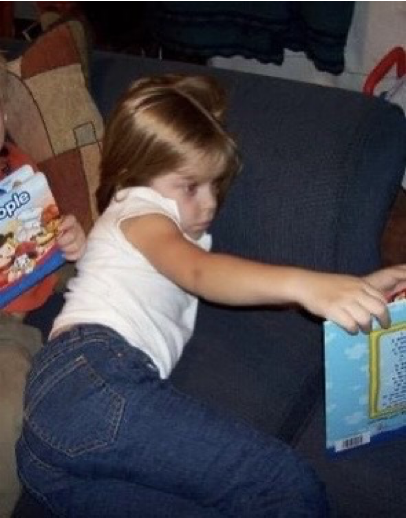by Johnna Blystone ’24
At least, that’s what I’m telling myself right now.
Sitting in the library, facing a deadline, counting down the minutes I have left until I can enjoy the rest of my Friday, it seems impossible to focus—much less to write about what I’m focused on. As a senior, I’ve written countless assignments for classes. My skills dissecting a prompt are unmatched and I have the utmost confidence in my ability to figure out what a professor is looking for and to deliver it in three hours or less: Times New Roman, 12 pt. font, one-inch margins, double-spaced and all.

Not to brag, or anything.
But here? Now? When asked to simply write creatively? I draw a blank.
When I was in high school, I would spend hours composing poetry and short stories on my school-issued Chromebook, escaping into a world of my own creation at a moment’s notice. By the time graduation came around, I had nearly 120 pages of original work in my repertoire. From contemplations to professions of love, angry outbursts to character studies, it was like my imagination gave me the keys into a thousand different voices, each one more delightfully complex and unique than the last.
I frequently envy the young writer I was then, with all her moxie and self-assuredness. Even in her more self-conscious moments, her voice was distinct and determined—perhaps mistaken in some moments, but willing to be for the sake of adventure into literary technique and experimentation.
I’d like to think that I’m on my way to being reunited with her soon.
Burnout is a very real phenomenon, and it can disguise itself in many ways. For me, the first sign of burnout is when I can no longer engage creatively with the world around me. After spending days, weeks, or even months in crisis mode, it becomes much easier to write an 8-page essay than a 12-line poem. When I start to wonder if I’m even good at creative writing anymore, I know it’s time to make some changes. It is necessary, of course, to meet deadlines and perform well in school; but it is also necessary to recognize when you’re neglecting the part of yourself that makes it all worth doing in the first place.

Though it’s certainly difficult for a double-major with up to 3 jobs at a time to do so, I regularly try to make room for the little poet laureate who makes her home in a comfy corner of my right-side-brain. I prop her up with freshly fluffed pillows, make her a mug of peppermint tea with honey, and buy her the prettiest stationery and ink pens to explore with. She writes me poems in return, reminding me of the romance in the changing of the seasons, the magic in the air shared between two friends bent in half with laughter, and the sanctity of each passing day as my last year in college steadily, somberly approaches.
She is my greatest friend, most trusted confidant, and favorite poet in the world. She deserves space to grow.
